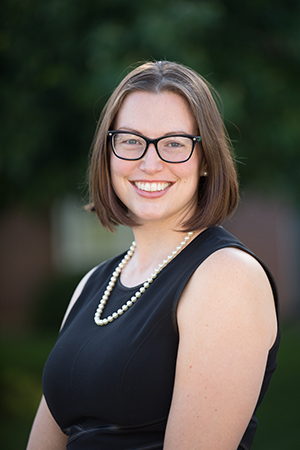
News Release, Kansas Geological Survey, October 11, 2022
LAWRENCE—A National Science Foundation grant will allow a researcher from the Kansas Geological Survey and her collaborators at seven other institutions to expand the reach of a program designed to reduce hostile workplace climate barriers that individuals face when entering STEM occupations.
Blair Schneider, KGS science outreach manager and associate researcher, is co-principal investigator on the $1.2 million "ADVANCE Partnership: Empowering scientists to transform workplace climate through the ADVANCEGeo community-based intervention program" grant. Schneider will lead the development of a trainer certification program and oversee logistics related to workshops offered by the ADVANCEGeo program.
"Research shows that hostile workplace climates have impacts at multiple levels: psychological levels, physiological levels, professional levels, economic levels, and broader societal levels. These barriers have resulted in a STEM workforce that is primarily made up of cis, white, able-bodied men, Schneider said.
Most of the solutions implemented to address these barriers have centered on financial hurdles, lack of access to resources or role models, and limited or non-existent networks. Though important, these solutions to date have not resulted in significant improvements in diversity in STEM and geoscience fields, Schneider said.

"Our team argues that one primary barrier, which is prevalent at every step of someone's recruitment and retention in STEM and geosciences, is the impact of hostile climates and exclusionary behaviors, which includes sexual and other forms or harassment, bullying, discrimination, and microaggressions," Schneider said. "I have experienced many of these exclusionary behaviors in my path to becoming, and staying, a scientist. I want to change the status quo so that others don't have to overcome these unnecessary and painful obstacles along the way."
The ADVANCEGeo program began work in 2017 to address sexual harassment in the earth and space sciences. Since then, the program has expanded to address a range of exclusionary and discriminatory behaviors. Schneider and her colleagues have developed a variety of workshops, tailored to different STEM disciplines, to address workplace climate, including implicit biases, microaggressions, bystander intervention training, safety in the field, and development of effective codes of conduct. During COVID lockdown, the team converted the trainings to a virtual format.
"The evaluation data show that the virtual setting is just as good, sometimes even better, for attendees. We plan to offer the majority of our trainings in the future in the virtual planet to reduce our footprint on Mother Nature," Schneider said.
The project has also developed a public resources website hosted by the Science Education Research Center at Carleton College.
The new funding will allow the ADVANCEGeo partnership to develop a trainer certification program to teach others how to lead workshops and discuss topics related to hostile climates and exclusionary behaviors, to work with other departments and organizations for an extended period instead of offering one-and-done workshops, and to develop a business model to ensure sustainability of the ADVANCEGeo program. More information about ADVANCEGeo trainings is available by visiting the Request a Workshop page on the program's website.
In addition to Schneider, ADVANCEGeo co-principal investigators are Erika Marin-Spiotta (lead PI, University of Wisconsin-Madison), Jessica Blois (University of California, Merced), Melissa Burt (Colorado State University), Meredith Hastings (Brown University), Sora Kim (University of California, Merced), Allison Mattheis (California State University, Los Angeles), Debbie Hanneman (Association for Women Geoscientists), and Billy Williams (American Geophysical Union).
ADVANCEGeo's network of partners includes more than 10 professional societies and non-profit organizations: the Association for Women Geoscientists, Earth Science Women's Network, American Geophysical Union, Geological Society of America, American Meteorological Society, Long-Term Ecological Research Network Office, BlackInGeoscience Network, GeoLatinas - Latinas in Earth and Planetary Sciences, Asian Americans and Pacific Islanders
The Kansas Geological Survey is a non-regulatory research and service division of the University of Kansas. KGS researchers study and provide information about the state's geologic resources and hazards, including groundwater, oil and natural gas, rocks and minerals, and earthquakes.